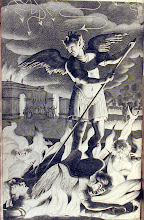Reading Milton's prose is a strenuous activity, and perhaps this is partly because Milton himself was so much in favour of strenuousness. Milton famously writes, also in Areopagitica,
I cannot praise a fugitive and cloistered virtue unexercised and unbreathed,The images here are taken from athletic competition. You need to train for the truth, and Milton sees himself as one of Truth's athletes. He explicitly offers this tract to Parliament "from the industry of a life wholly dedicated to studious labours" as if that is a kind of guarantee of its truth (239). It’s not only in his prose that Milton likes to point out how hard he works. In “Lycidas” too he makes clear that the poet’s lot is to “scorn delights, and live laborious days” (l. 72).
that never sallies out and sees her adversary, but slinks out of the race where
that immortal garland is to be run for, not without dust and heat.
(247-48)
The strange thing about the training recommended by Milton is that it deliberately includes things that are bad for the athelete. The training for truth should include lies, which one would think is bad for truth. Bad books should be printed mainly so that good men can use them for resistance training. Similarly, Milton's recommended training for virtue includes vice, since Adam and Eve's explusion from Paradise seems to have meant that ever after humans must discover what is good painfully, by slogging through the bad: "Assuredly we bring not innocence into the world, we bring impurity much rather; that which purifies us is trial, and trial is by what is contrary” (248).
